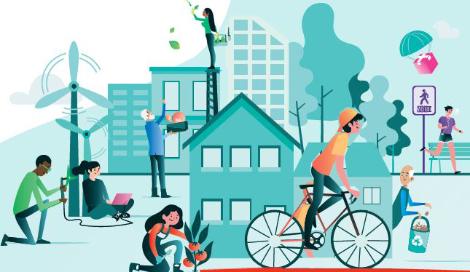Tomorrow my territory 17 Adapting to climate change
Climate change
November 2019
Agence pour l’Environnement et la Maîtrise de l’Energie (ADEME)
The 20 factsheets in the collection « demain MON TERRITOIRE » have been designed to give candidates and elected officials practical keys to take action, to open up the field of possibilities based on the experiences of other elected officials, from small towns to conurbations, large urban areas or sparsely populated areas. In the four corners of France, both in metropolitan France and in the French Overseas Territories, many of them are taking action, together with the players in their territories, to prepare for the future by taking action to mitigate climate change and adapt to its effects. With its knowledge and presence throughout the country, ADEME supports them with its tools, activities and financial aid.

Why is it important to prepare for the consequences of climate change?
The climate is changing, and it is now a certainty that climate conditions will change profoundly in the 21st century as a result of accelerating global warming. The living conditions of the French will be disrupted, with significant impacts on the environment, natural and agricultural resources, economic activities and health. Heat waves, storms, floods, water shortages, forest fires, retreating coastlines… everyone can already measure the effects. Now it’s time for communities to get organized. And to think about long-term development projects, investments and activities. Reacting to climate change is not only about protecting its inhabitants, it is also about continuing the fight against greenhouse gas emissions to mitigate future climate change as much as possible, for the good of all.
How do you do it?
-
Adapting to climate change requires a long-term vision. A diagnostic phase is launched to determine the vulnerability of the territory to the potential consequences of climate change. On the basis of these results, a strategy is drawn up and the relevant actions to be taken, their scope and also their pace, are imagined.
-
A new framework is being developed to discuss ways to address this challenge and to foster ownership of the process by the inhabitants. We can start with « no-regrets » actions, which will always be successful and which will give impetus to this transition.
-
We fight against urban overheating without using air conditioning. When designing buildings or renovating them, thermal insulation is favoured. We are turning to other techniques for natural cooling and ventilation: Provençal wells, solar protection, roof and road surfaces, etc. Against urban heat islands, we are imposing more nature, replacing concrete with permeable materials or earth, and giving more space to green spaces and bodies of water. We are reviewing the layout of neighbourhoods under construction, with an organization of streets and buildings that favours drafts and shade.
-
Water will become an even more precious commodity. We preserve this resource by saving it. This means rehabilitating infrastructures, changing behaviours to reduce consumption, recovering rainwater for cleaning or watering.
-
We protect ourselves from the risks of flooding or tidal waves. The infiltration of water into the soil is encouraged by the dewatering of certain areas: schoolyards and car parks are cleared of debris, nature is restored to the developed banks of rivers, etc. At the seaside or riverside, a buffer zone is established by transforming, for example, the agricultural cultivation of the polders into pasture or hiking areas.
-
We must anticipate that certain economic activities will suffer from global warming, such as winter sports in the mountains. Reorienting the tourist offer and highlighting other assets of the territory are tracks to be explored to diversify the activity. The same applies to agricultural production, which can be more or less affected depending on the territory.